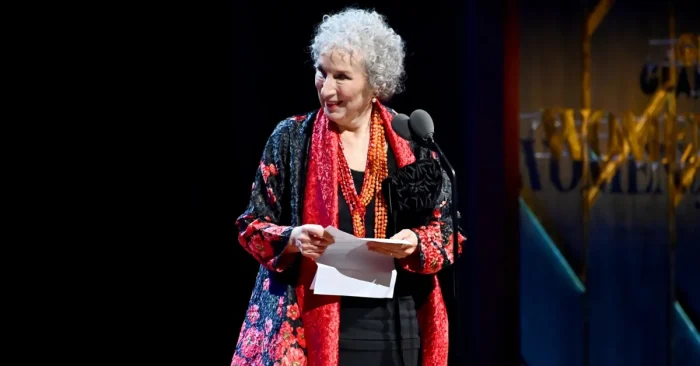Margaret Atwood – Biography
Early Life and Education of Margaret Atwood
Margaret Atwood was born on November 18, 1939, in Ottawa, Canada. She grew up moving between the city and the remote forests of Northern Quebec, where her father worked as a forest entomologist. This unique upbringing, surrounded by nature and far from modern distractions, deeply influenced her imagination and writing. Atwood became an avid reader early on, devouring books of mythology, science fiction, and literature. This love of stories sparked her desire to write. She attended Leaside High School in Toronto and later earned her bachelor’s degree in English from the University of Toronto’s Victoria College in 1961. Atwood then pursued graduate studies at Harvard University’s Radcliffe College, earning a master’s degree in 1962 and continuing doctoral studies, though she chose not to complete her dissertation as her writing career took off.
Early Writing Career and First Successes
Atwood began publishing poetry and short fiction in her university years, quickly gaining attention for her sharp insights and unique voice. Her first poetry collection, “Double Persephone,” appeared in 1961, winning her early literary recognition. Throughout the 1960s and 1970s, she published a steady stream of poetry and novels that explored themes of gender, power, and identity. Her 1969 novel “The Edible Woman” marked her breakthrough, examining societal expectations placed on women. Novels like “Surfacing” and “Lady Oracle” followed, showcasing Atwood’s growing mastery of narrative and her ability to weave social critique into engaging stories. As her reputation grew, she became a leading figure in Canadian literature, praised for her complex characters and fearless exploration of controversial topics.
Breakthrough with The Handmaid’s Tale
In 1985, Atwood released “The Handmaid’s Tale,” which became her most iconic work. Set in the dystopian world of Gilead, the novel depicts a society where women’s rights are stripped away and totalitarian rule prevails. The book’s chilling portrayal of oppression, religious extremism, and resistance resonated with readers worldwide. It won numerous awards and solidified Atwood’s global reputation as a powerful and prophetic storyteller. Over time, “The Handmaid’s Tale” has remained culturally relevant, with its themes echoing contemporary debates on women’s rights and freedom. The story’s impact was amplified when it was adapted into a highly successful television series, bringing Atwood’s vision to new audiences and cementing the novel’s place as a modern classic.
Expanding Her Literary Range
While “The Handmaid’s Tale” made her a household name, Atwood’s career encompasses a vast and diverse body of work. She has written more than 50 books, spanning novels, poetry, short stories, and essays. Her historical fiction novel “Alias Grace” revisits a 19th-century murder case, blending fact and fiction. “The Blind Assassin,” published in 2000, won the prestigious Booker Prize for its intricate, layered narrative. In her speculative fiction “MaddAddam Trilogy,” Atwood explores genetic engineering, climate change, and humanity’s survival in a post-apocalyptic world. Each of her works tackles serious themes but always with captivating plots and relatable characters, ensuring her wide appeal across different genres and readers.
Public Voice and Activism
Beyond her writing, Atwood is an influential public intellectual and outspoken activist. She advocates for environmental preservation, gender equality, and freedom of speech. These values often permeate her fiction, but Atwood also speaks directly on global platforms, writes essays, and participates in public debates. Her passion for the environment connects deeply with her upbringing close to nature. She’s also embraced technology, participating in innovative projects like the “Future Library,” where her work will remain sealed until 2114, offering future generations a glimpse of today’s literary voice. Atwood’s ability to engage with contemporary issues has kept her work relevant across decades.
Personal Life and Influence
Margaret Atwood shared her life and literary journey with fellow Canadian writer Graeme Gibson, her partner until his passing in 2019. The couple had one daughter and lived much of their lives in Toronto, where Atwood continues to reside. Despite global fame, Atwood remains grounded and deeply connected to her Canadian roots. She continues to write, speak, and engage with fans worldwide. Her work has inspired countless authors, artists, and activists, earning her recognition as one of the most important literary voices of her generation. Her blend of elegant prose and fearless critique continues to spark conversations about power, identity, and the human condition.
Legacy of Margaret Atwood
Margaret Atwood’s legacy lies in her remarkable ability to blend compelling storytelling with profound social commentary. Her works challenge readers to examine complex issues like gender dynamics, environmental destruction, and political oppression. By fusing speculative fiction with real-world concerns, she has expanded the boundaries of literature and inspired generations of writers. Her influence extends beyond the page, shaping cultural conversations and encouraging critical thought about the world we live in. With an enduring career and continued relevance, Atwood stands as a towering figure in both literature and activism.
Conclusion
Margaret Atwood’s journey from a young nature-loving girl in Canada to an internationally acclaimed author reflects her unyielding curiosity, creativity, and courage. Her storytelling has not only entertained millions but also provoked important discussions about society’s most pressing issues. As she continues to write and engage with readers worldwide, her work remains a powerful testament to the enduring influence of literature in shaping how we see ourselves and our world.
Frequently Asked Questions (FAQs)
What is Margaret Atwood best known for?
She is best known for her dystopian novel “The Handmaid’s Tale,” exploring themes of oppression, power, and resistance.
Has Margaret Atwood won major awards?
Yes, she has won numerous awards, including the Booker Prize for “The Blind Assassin.”
Where does Margaret Atwood live?
She lives in Toronto, Canada.
What themes does Atwood explore in her work?
Her work often explores feminism, environmental issues, political oppression, and power structures.
Is Margaret Atwood involved in activism?
Yes, she actively advocates for environmental conservation, gender equality, and freedom of speech.
















